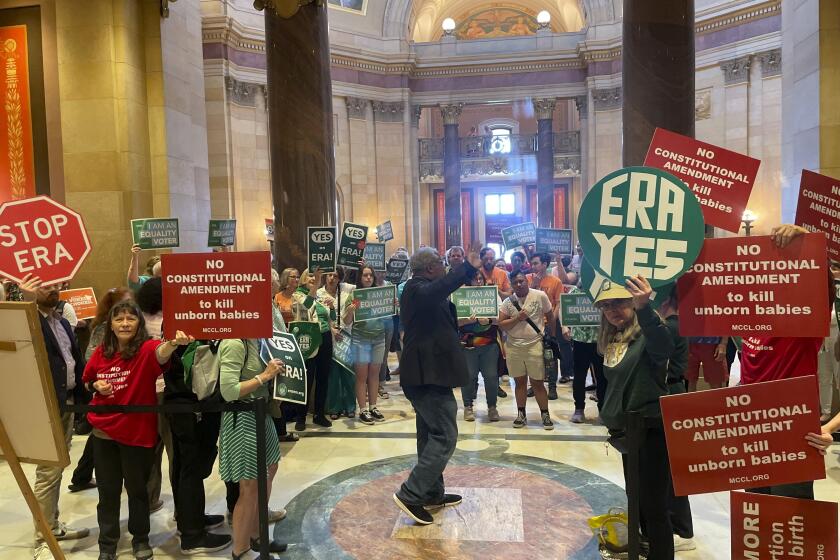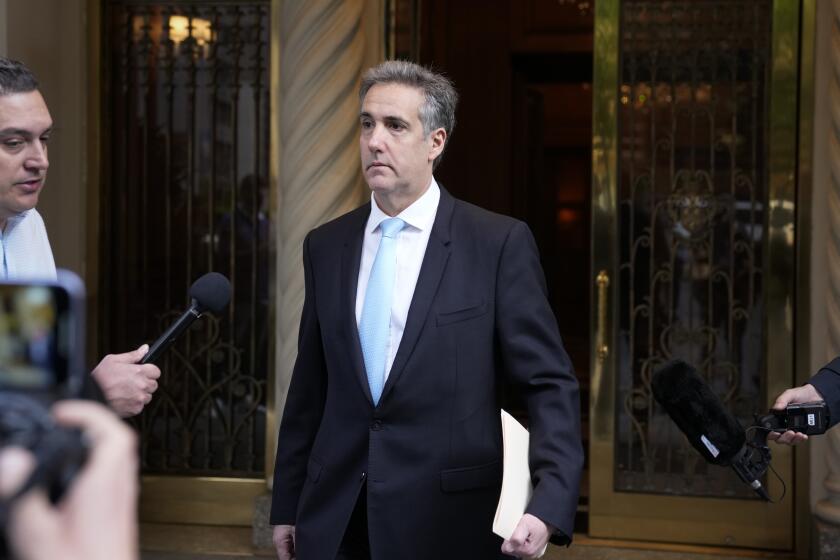Analysts Predict Deal Will Trigger Short-Term Damage to Economy : Outlook: Budget negotiators believed that they had no choice but to forge ahead. The true test of the pact is expected soon on Wall Street.
The new budget accord may be just what the doctor ordered for the nation’s ailing economy but the patient is likely to get a lot worse before it gets better, government and private analysts said Sunday.
Although almost every economist has long prescribed a reduction in federal borrowing, several expressed fears that the short-run impact will be negative, nudging the economy ever closer to a recession.
“The economy is so weak right now that the last thing you want to do is hit it over the head with a massive dose of fiscal restraint--but that’s what they’ve done,” said Irwin Kellner, chief economist at Manufacturers Hanover Bank in New York.
“You have to be honest and admit there will be a modest short-term contractionary effect,” Benjamin Friedman, a Harvard economist who has long been a fervent proponent of cutting the deficit, said Sunday.
“The problem is that higher taxes and lower spending affect the economy immediately, while lower interest rates take time to boost economic investment,” he explained.
Whatever the immediate damage to the economy, however, budget negotiators here believed that they had no choice but to forge ahead.
Officials are hoping that their resolve--which could easily have been diverted by arguments that the Persian Gulf crisis should let them off the hook once again--will assuage financial markets that have long urged Washington to produce a credible long-run deficit-reduction pact.
They also are hoping that the increased leeway on the budget will prompt Federal Reserve Chairman Alan Greenspan to ease interest rates.
“This is not a phony smoke-and-mirrors program,” said Senate Finance Committee Chairman Lloyd Bentsen (D-Tex.). “It ought to signal the Federal Reserve to ease up in interest rates and start stimulating the economy.”
But the Fed, which appears to be more worried about reviving inflation, is likely to move cautiously as long as the dollar remains weak and oil prices remain high.
To be sure, budget negotiators did not overlook the possibility that the harsh medicine contained in the budget agreement might prove risky.
Sen. Pete V. Domenici (R-N.M.) conceded Sunday that the new budget accord “has a lot of pain in it,” but insisted that “the result is good for the country.”
“While things may not tomorrow morning get better,” Domenici added, “this package is ultimately healthy for the American economy. . . . I’m convinced, having worked on this kind of thing, that we’d better do it because we won’t get another chance.”
The economic forecast that the budget negotiators published Sunday shows precisely this sort of pattern.
Economic officials now expect the U.S. economy to eke out a bare 0.7% gain in 1990--essentially an acknowledgement that a recession is possible in the months ahead--before slowly recovering at a 1.3% pace in 1991 and 3.8% in 1992.
They also show the inflation rate--expected to reach 5.21% in 1990--slowing to 4.6% in 1991 and 3.4% in 1992.
If the projections prove accurate, President Bush should benefit from the visibly improved economic situation in time for his reelection campaign in 1992.
But a lot of conservatives are convinced that Bush is making a fatal error in signing a deficit-reduction pact that does not contain his long-sought capital gains tax cut.
“This is a bad deal for the economy,” said Jude Wanniski, known for his early advocacy of former President Ronald Reagan’s “supply-side” tax program. “Getting the capital gains rate reduced and indexed is the only way of pulling the economy out of its slump.”
Many Republican lawmakers echoed Wanniski’s views. Rep. Dana Rohrabacher (R-Lomita) termed the package “a road map to recession” and added: “It’s a cave-in to the Democratic big spenders. . . . It’s ridiculous. The system’s broken down.”
Most economists, however, said that the true test of the deficit accord will come soon on Wall Street.
If investors think the budget agreement will substantially reduce the federal government’s long-term borrowing needs, opening up fresh credit for private investment, they could drive interest rates down in the bond market this week.
That will provide a glimmer of hope as Congress debates whether to approve the budget measure.
“If financial markets believe this will put the government on the track of smaller deficits in the future, they could provide a lot of latitude for the Fed to ease,” said Jerry Jordan, chief economist at First Interstate Bank in Los Angeles.
WHAT THE ACCORD CONTAINS Here are the major elements of the five-year, $500-billion budget deficit reduction accord that President Bush and key congressional leaders announced on Sunday:
Savings from domestic benefit programs: $119 billion.
* Requires 33 million Medicare recipients to pay more for health coverage. The $28.60 doctor’s care premium, which currently covers 25% of the cost, would increase by $5.70 per month next year, and rise in steps for five years until it covers 30% of the cost. The yearly deductible for hospital costs doubles to $150. Saves $30 billion.
* Imposes new Medicare cost-cutting requirements on doctors and hospitals to save $30 billion.
* Limits subsidies to farmers to save $13 billion.
* Eliminates civil service lump sum retirement payments for $8.1 billion in savings.
* Reforms student loan program to save $2 billion.
* Requires Postal Service to cut $4.2 billion from costs.
* Delays unemployment insurance payments for 2 weeks, saving $4.6 billion.
* Reforms federal housing programs to cut costs by $2.5 billion.
Tax changes: $133.8 billion.
* Raises the gasoline tax to 19 cents a gallon from 9 cents in two 5-cent-per-gallon jumps.
* Adds a new tax on petroleum of 2 cents per gallon, which in turn affects gasoline prices.
* Increases tobacco taxes from 16 cents to 20 cents next year; 24 cents in 1993.
* Raises levies on alcoholic beverages.
* Boosts airline ticket tax from 8% to 10%.
* Imposes a new luxury tax on purchases of expensive autos, furs, jewelry, private airplanes and boats.
* Boosts salary cap on payroll taxes (1.45% out of total 7.65% Social Security tax) from $51,300 to $73,000 to help cover Medicare costs.
* Limits itemized deductions for those with incomes above $100,000.
* Requires insurance companies to pay an extra $2 billion a year in taxes.
* Requires state and local employees to start paying Medicare taxes.
Domestic programs: Capped.
Non-military programs subject to annual appropriations would be held to the projected rate of inflation. Any new programs must be introduced on a pay-as-you-go basis.
Interest on the national debt.
Savings on interest due to lower borrowing needs would total an estimated $64.8 billion over the five-year period.
More to Read
Get the L.A. Times Politics newsletter
Deeply reported insights into legislation, politics and policy from Sacramento, Washington and beyond. In your inbox three times per week.
You may occasionally receive promotional content from the Los Angeles Times.






